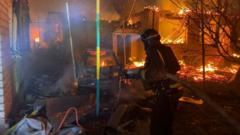Is Russia's Massive Attack on Ukraine a Game Changer While Kyiv Strikes Back?

Published: 2025-08-30 13:07:03 | Category: technology
In a significant escalation of the ongoing conflict, Russia has launched a "massive" overnight attack on Ukraine, targeting southern and central regions and resulting in casualties, while Ukraine retaliated by striking Russian oil refineries. This latest wave of violence highlights the enduring tensions and the complexities of international diplomacy surrounding the war.
Last updated: 26 October 2023 (BST)
Key Takeaways
- Russia launched over 500 drones and 45 missiles, impacting 14 Ukrainian regions.
- Casualties include one fatality in Zaporizhzhia and 28 injuries, with three children among the wounded.
- Ukraine targeted Russian oil refineries in Krasnodar and Syzran, causing significant damage.
- Ongoing international discussions aim to address the conflict and consider further sanctions against Russia.
- The situation remains fluid with continuous military engagements reported in various regions.
Overview of the Recent Attack
Ukrainian officials reported a large-scale assault by Russian forces overnight, marking one of the most intense attacks in recent months. According to Ukrainian President Volodymyr Zelensky, the assault involved over 500 drones and 45 missiles aimed at multiple regions, including Zaporizhzhia, Dnipropetrovsk, and Kyiv.
Human Impact of the Assault
The deadly attack resulted in the death of one woman in Zaporizhzhia and left 28 others injured, including three children. Local officials have expressed deep concern over the escalating violence, particularly as Dnipropetrovsk faced significant bombardment for the second night in a row. Governor Serhiy Lysak urged residents to take cover as the situation unfolded.
Military Developments and Strategic Targets
While the central and south-eastern regions of Ukraine suffered the most from the recent strikes, Ukrainian forces retaliated by targeting Russian oil infrastructure. The Ukrainian military reported successful strikes on the Krasnodar and Syzran oil refineries, both critical to Russia's war efforts.
These refineries reportedly produce around three million tons of oil annually, making them significant targets for Ukraine's military strategy. The Russian authorities confirmed damage to one of the process units at the Krasnodar refinery but reported no casualties from the strikes.
Russian Response and Military Actions
In response to Ukraine's strikes, Russia's defence ministry claimed to have intercepted 20 Ukrainian drones, including 18 over Crimea, which Russia annexed in 2014. Additionally, Russian forces announced they had captured a rural settlement in Donetsk, known as Komyshevakha, although Ukraine has not confirmed this development.
International Implications and Diplomatic Efforts
As the conflict continues to escalate, international diplomatic efforts are underway to seek a resolution. US-led initiatives have aimed at fostering dialogue, though progress remains slow. Zelensky highlighted the necessity for global action against Russia, emphasising the importance of sanctions to curtail Moscow's military capabilities.
European foreign affairs ministers convened in Denmark to discuss the situation in Ukraine, indicating a united front among EU nations. One significant proposal discussed was the potential freezing of approximately €210 billion (£181.7 billion) worth of Russian assets, a move that could further strain Russia's economy.
The Role of Sanctions in the Ongoing Conflict
Sanctions have become a primary tool for the international community in addressing Russia's aggression. France's foreign minister, Jean-Noel Barrot, indicated that new proposals for sanctions against Russia would be tabled during the discussions, aiming to diminish the resources that Russia invests in its military operations.
What Comes Next?
The next steps in the conflict remain uncertain, with both sides poised for further military engagements. As the international community continues to deliberate on sanctions and diplomatic strategies, the humanitarian impact of the war remains profound. With each attack, the toll on civilians and infrastructure escalates, raising urgent concerns about the long-term implications of the conflict.
Conclusion
The recent massive attack by Russia on Ukraine's southern and central regions underscores the ongoing volatility of the conflict. As both military actions and diplomatic efforts unfold, the international community faces pressing challenges in seeking a peaceful resolution. How will these developments shape the future of Ukraine and its relations with the world? The situation remains fluid, and the global response will be crucial in determining the outcome of this protracted conflict.
#UkraineConflict #RussiaUkraineWar #InternationalDiplomacy
FAQs
What triggered the recent attack by Russia on Ukraine?
The recent attack was part of an ongoing military campaign by Russia, involving the use of drones and missiles aimed at various regions in Ukraine, reflecting the heightened tensions in the conflict.
How has Ukraine responded to Russian attacks?
Ukraine has retaliated by targeting Russian oil refineries, which are crucial for Russia's military efforts, and has focused on damaging infrastructure that supports the war.
What are the implications of the proposed sanctions against Russia?
Proposed sanctions aim to freeze significant Russian assets, which could hinder Russia's ability to finance its military operations and potentially lead to a shift in the conflict's dynamics.
How many casualties have resulted from the latest military actions?
The recent attacks have resulted in one fatality and 28 injuries, including three children, highlighting the ongoing humanitarian impact of the conflict in Ukraine.
What role is the international community playing in the Ukraine conflict?
The international community is actively discussing diplomatic measures and sanctions to address the conflict, aiming to support Ukraine and pressure Russia to cease hostilities.



